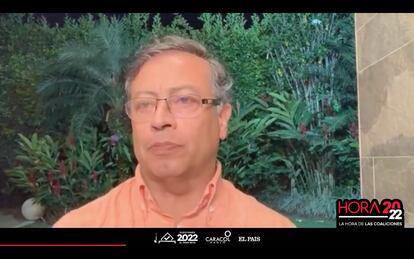The pre-candidates for the Colombian presidential elections of the left-wing coalition Historical Pact, during the debate.
Gustavo Petro has been, for quite some time now, the rival to beat in the face of the presidential elections in Colombia, with support that puts him at the head of all the polls in a fragmented political landscape.
This favoritism has allowed the former mayor of Bogotá to forge the Historical Pact to suit him, although he formally competes with the environmental leader Francia Márquez, the former governor of Nariño Camilo Romero, the Wayú indigenous leader Arelys Uriana and the Christian Alfredo Saade in the consultation of the left-wing coalition on March 13.
None of the candidates attacked this Thursday in the debate organized by Caracol Radio and EL PAÍS, in which Petro glimpsed a progressive axis in Latin America if he reaches the presidency.
All agreed to vindicate the Historical Pact as the true option for change and transformation, the most repeated words throughout the meeting.
While a dozen pre-candidates are still fighting side by side for the candidacy of the other two center and right-wing coalitions, Petro comfortably leads the preferences within his bloc – between 77% and 90% of those surveyed.
For this reason, the debate, moderated by the journalist Diana Calderón, began with the question of whether a consultation makes sense when there is such a clear favorite.
"Each one of us raised our aspiration to the presidency from the beginning... but then we came to agree on a program that recognizes ethnic and cultural diversity, a program that recognizes the need for structural transformations," said Francia Márquez.
"We represent the diversity of the country... we came to share, to build and to compete," Romero seconded her, while Uriana stressed that her entry was arranged and debated among social organizations, and Saade defined himself as a representative of "progressive Christians." –despite the fact that his entry has been questioned for his positions on issues such as abortion–.
Four years ago, Petro lost in the second round against President Iván Duque, although he obtained more than eight million votes (43%), and has been campaigning ever since.
"A consultation is not only to define a candidate," he said when it was his turn, connected via Zoom from the city of Cali.
“The experience we had in 2018 showed us that consultations compete with each other, and determine the final result: the president,” he noted.
"If we win against the other consultations [Equipo por Colombia and Coalición Centro Esperanza], we would be ensuring that we win the presidency, perhaps in the first presidential round," on May 29, he predicted optimistically.
With the flag of change on the rise, the debate addressed the positions of the candidates of the Historical Pact against the economic model.
"The environmental crisis, the humanitarian crisis that exists in the country today, the crisis of the armed conflict, is evidence of the failure of the neoliberal economic model," diagnosed Francia Márquez.
“Rethinking an economic model of development has to be based not on accumulation and dispossession, but on the contrary, on distribution and the country's social and ecological well-being.
The first line of the economy cannot continue to be extractivism, we want it to be an agroecological production system”, she pointed out.
"I think the country has to be frightened and frightened if we continue as we have been, that economic growth means these levels of inequality and poverty," Romero added.
"The wealth is actually in the jobs," Petro argued.
“What we are proposing is to increase jobs in Colombia, which implies agriculture, industry, tourism, and stop depending on oil and coal.
First, because the world demands it”, he maintained when defending his proposal to start a transition towards a decarbonized economy, in which the five applicants agreed.
How are oil and coal currencies replaced in the short term?
With tourism, agro-industrialization of cannabis, strengthening the added value of coffee and with the use of carbon bonds to preserve the Amazon rainforest, he said.
The pre-candidate of the Historical Pact Gustavo Petro, during his intervention through zoom.
Petro, who belonged to the extinct M-19 guerrilla in his youth, still arouses resistance in some sectors of society.
When asked about the fears of businessmen, he was defensive.
"The press is reaffirming the type of campaign that our opponents carry out," he complained.
The leader of the polls questioned being asked if Colombia is going to look like Venezuela, when "Venezuela is sunk in its economy due to its dependence on oil, and what we are proposing is the opposite."
The former mayor of Bogotá has managed to maintain a frenetic activity in this 2022. So far this year he has been divided between debates, outings to the public square in massive events in different corners of Colombia and an international agenda that It has led him to visit Spain twice, where he held a meeting with Pedro Sánchez, and to meet with Pope Francis at the Vatican.
He has also displayed on social networks the invitation on March 11 to the inauguration of Gabriel Boric in Chile.
The international front was present at the meeting.
“A new progressive axis is going to be constituted in Latin America.
Basically, it depends on the electorates, between Lula, Boric, and hopefully the one who speaks to them in Colombia”, pointed out Petro, who outlined a path towards knowledge societies, which are capable of industrializing their countries and modernizing agriculture via agrarian reforms. .
In short, based on production and knowledge, “build a multicolored democracy in our Latin America.
For Colombia that specifically means an era of peace.”
He also exhibited a very critical position with the Daniel Ortega regime in Nicaragua.
“In that old progressivism, in quotes, that was anchored to the fossil economy, there is no option for Latin America.
Latin America's option is knowledge, production,
Subscribe here to the EL PAÍS América newsletter and receive all the key information on current affairs in the region

